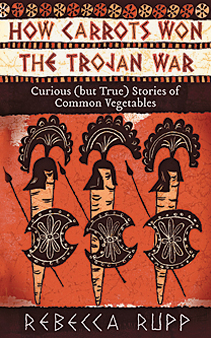REVIEW: How Carrots Won the Trojan War: Curious but True Stories of Common Vegetables
Book by Rebecca Rupp
Share
 Modern-day food wars, over what’s good for us (in ethical and health terms) and just plain good to eat, have a long history. Back in the 19th century, when Americans were boiling green beans for 90 minutes, full-blown vegetarianism was starting to emerge, with both sides claiming the moral high ground. George Bernard Shaw might announce that “a man of my spiritual intensity does not eat corpses,” but fellow Briton J.B. Morton denounced “the wicked, shifty eyes” of vegetarians, and the way they “laugh in a cold, calculating manner.”
Modern-day food wars, over what’s good for us (in ethical and health terms) and just plain good to eat, have a long history. Back in the 19th century, when Americans were boiling green beans for 90 minutes, full-blown vegetarianism was starting to emerge, with both sides claiming the moral high ground. George Bernard Shaw might announce that “a man of my spiritual intensity does not eat corpses,” but fellow Briton J.B. Morton denounced “the wicked, shifty eyes” of vegetarians, and the way they “laugh in a cold, calculating manner.”
Rupp’s book is full of details about the origin and spread of some of our most common foods and, most entertainingly, what people traditionally considered their effects. Any vegetable that even vaguely resembled a penis was thought an aphrodisiac, but none more so (naturally) than asparagus. During the Renaissance, it vied with dried fox testicles as a popular pre-Viagra remedy for the afflicted, and as late as the 19th century the vegetable was kept off the table in French girls’ schools lest it give rise to thoughts unsuitable for young ladies.
Carrots were considered anti-laxatives, which is why, according to legend, the Greek soldiers hiding in the Trojan Horse ate them to “bind their bowels,” so they wouldn’t have to exit the horse and give the game away. The variety that Greeks imagined Agamemnon’s men munching would have been purple-coloured and multi-branched natives of Afghanistan: conical carrots didn’t turn up in Europe until the 12th century, and it took Dutch breeders—no surprise there—to develop orange varieties four centuries later.
Something similar happened to sweet peas, bred from an ancestor so tough biologists figure our ancestors must have peeled and roasted them, but what happened to corn was an order of magnitude different. Now “a biological monstrosity,” corn is so dependent on human agency that it can no longer manage its own reproduction. Should humans die out, corn would rapidly follow. If we are what we eat, and our most “natural” foods have long been shaped to our hands, what does that say about us?